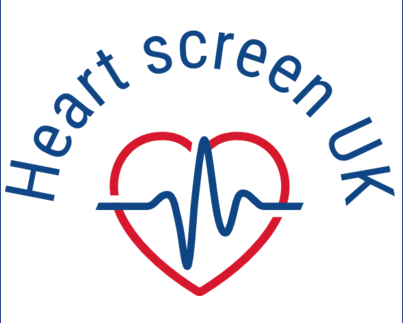SOLUTIONS
THE ONLY DIAGNOSTIC TEST FOR CORONARY HEART DISEASE THAT IS HIGHLY ACCURATE AND NON INVASIVE
The Cardisio heart screening test (Cardisiography) is a highly-accurate test to diagnose coronary heart disease with a sensitivity of 98% and a specificity of 85%. It is a non-invasive, examiner independent, reproducible, fast and cost-effective diagnostic procedure for the detection of hemodynamic relevant stenoses of the coronary arteries at rest.
Because of its reliability and easy application, the Cardisio screening test offers a complementary screening to legacy methods including electrocardiogram (ECG), stress ECG and echocardiography. The Cardisiogram helps identify a risk for CHD and to determine further diagnostic steps.
Compared with the golden standard of coronary diagnostics the coronary angiography with a specificity and sensitivity of 100%, non-invasive procedures such as the resting ECG and resting Echocardiography show a significantly lower sensitivity and specificity. Only under exercise, these increase for both methods but require the attendance of a physician, further more in case of stress echocardiography, the results are examiner dependent and both procedures are time consuming (15-30 min). Other non-invasive procedures like Myocardial Perfusion Scintigraphy (MPS), Coronary Computer Tomography (CCT) or Cardiac Magnetic Resonance Imaging (MRI) require a considerable equipment and personnel expenditure, the presence of a Physician and also represent a significant cost factor.
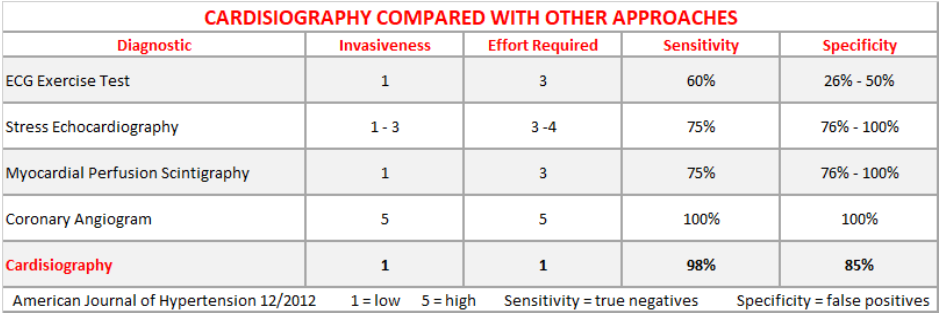
CARDISIOGRAPH’S SCIENTIFIC APPROACH
Cardisiography is based on a 3-dimensional scan of the heart. It relies on automated analysis, eliminating room for human error in diagnosing. The diagnosis is done via a computer-based infinitesimal, three-dimensional Calculation of the excitation processes of the mammalian heart based on a specific algorithm in conjunction with a neural network correlated to the intrinsic blood as well as the specific spatial orientation of the myocardium in the di-pole field as a function of time starting from a defined point.
The Cardisiography delivers graphic representations of the electro-physical characteristics of the heart. Cardisio utilizes machine-based learning to continuously optimize its own algorithm.
In its development, the Cardisio screening test was correlated with matching representative cohorts, including over 500 patients with clinical indication for a coronary angiogram.

Fig 1: Healthy Cardisiogram

Fig 2: Pathologic Cardisiogram
The initial Cardisiography clinical study is based on a sample of 182 patients who had been admitted for a coronary angiogram at various heart centres in Germany. Data collection was conducted from April until September 2017 and included 89 male patients, age range 39-84 and 93 female, age range 28-88. The researchers performed a on each patient a Cardisiography and compared the results to the angiogram.
The male sample demonstrated a sensitivity of 97.3%, with a negative predictive value of 99%, and a specificity of 62.5%, with a positive predictive value of 22.4%. The female sample generated a sensitivity of 86%, with a negative predictive value of 97%, and a specificity of 75%, with positive predictive value of 26.5%. A prevalence of 10% was assumed for both genders, meaning that roughly 10% of the overall population suffer from coronary heart disease. By definition, patients undergoing a coronary angiogram test positive at a much higher rate than the general population. Statistical computations were used to correct for the difference in distribution of positive test results, which resulted in a Negative Predictive Value (NPV) of 99% for both genders.

Fig 3: Left: Results for the entire male group including training, validation and test data; Right: Results exclusively for test data.
HOW CARDISIO WORKS
The Cardisio test is a user-friendly screening test for coronary heart disease. Administering the test requires minimal training and is being conducted on a resting heart. The system consists of three components, the Cardisio Graph to physically administer the test, the Cardisio App to start, end and present the results of the Cardisiogra-phy, and the Cardisio Cloud, where a proprietary, self-training algorithm conducts the analysis and produces the diagnoses.
Step 1.
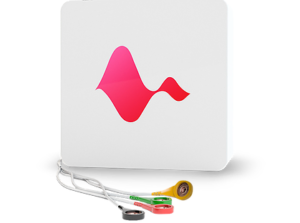
- The heart is in a resting state.
- Test person applies electrodes to chest
- Electrodes are connected to the Cardisiograph.
- Cardisiograph connects via a USB cable to a PC
Step 2.
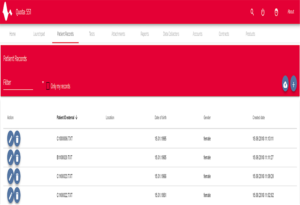
- The clinician initiates the test using the Cardisio Application on a PC.
- The test takes four minutes to complete.
Step 3.
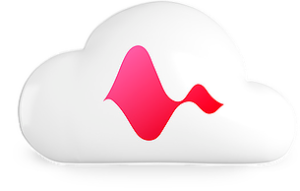
- After 4 minutes the data collection will complete and the Cardisio Application will tell the Clinician to wait while the data is securely transmitted to the Cardisio Cloud.
- The Cardisio Cloud is a proprietary algorithm, using machine learning artificial intelligence which analyses the data.
- Once analysed the results are transmitted back to the clinician.
Step 4.
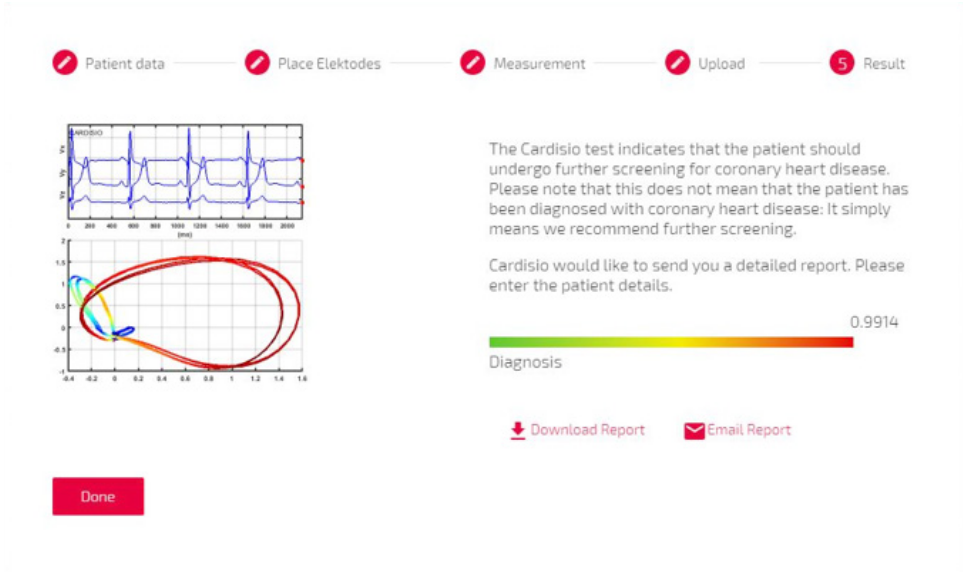
- Depending on the test result, the app displays either a green light or a red light.
- A green light indicates with virtual certainty that the test person does not have coronary heart disease.
- A red light indicates that the person should consult with a physician about further screening for coronary heart disease.
- A PDF with the full results is sent to the Clinician for presentation to the patient
INSIGHTS
The Cardisio App guides you through the screening test in 5 steps. The whole process takes between 6 to 8 minutes.


In step 5 the screening result including a clear index will be shown.
Interpretation Guidelines, Parameters and Examples are included in the documentation.
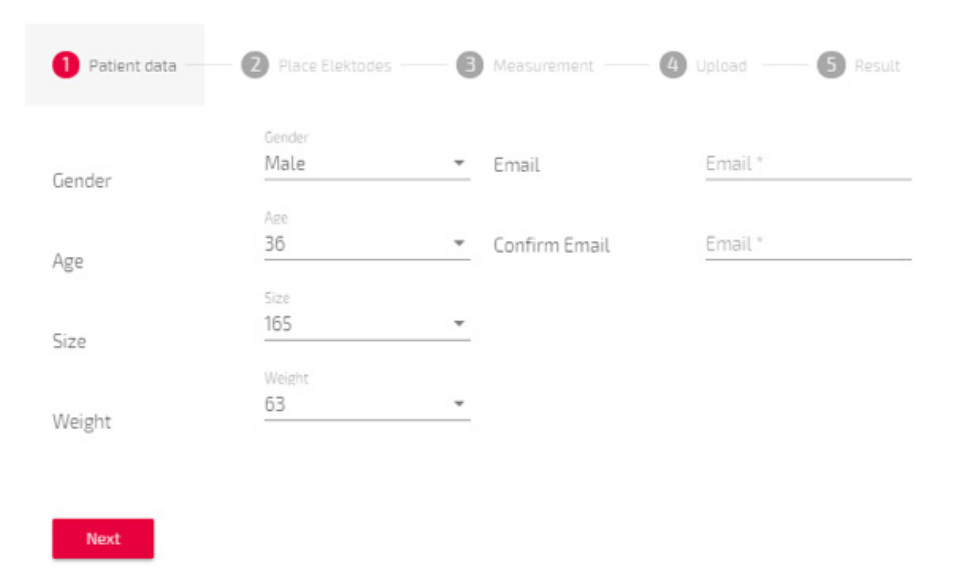
Fig 5: Start the process – enter the patient BMI data

Fig 6:Cardisiography results presentation.
ABOUT CARDISIO
Cardisio GmbH, established in Frankfurt/Germany in 2016, is a privately held health company. Cardisio’s US headquarters are in San Francisco, California
Scientific Advisory Board:
- Prof.Dr.med. Dr. h.c. Reiner Körfer (Germany)
- Prof.Dr.med. Gero Tenderich (Germany)
- Michael M.Koerner, MD, PhD Adjunct Clinical Professor (USA)
- Wilfried Jacobs (Germany)
Cardisio is a registered trademark of Cardisio GmbH in the United States.
© Cardisio GmbH 2018
